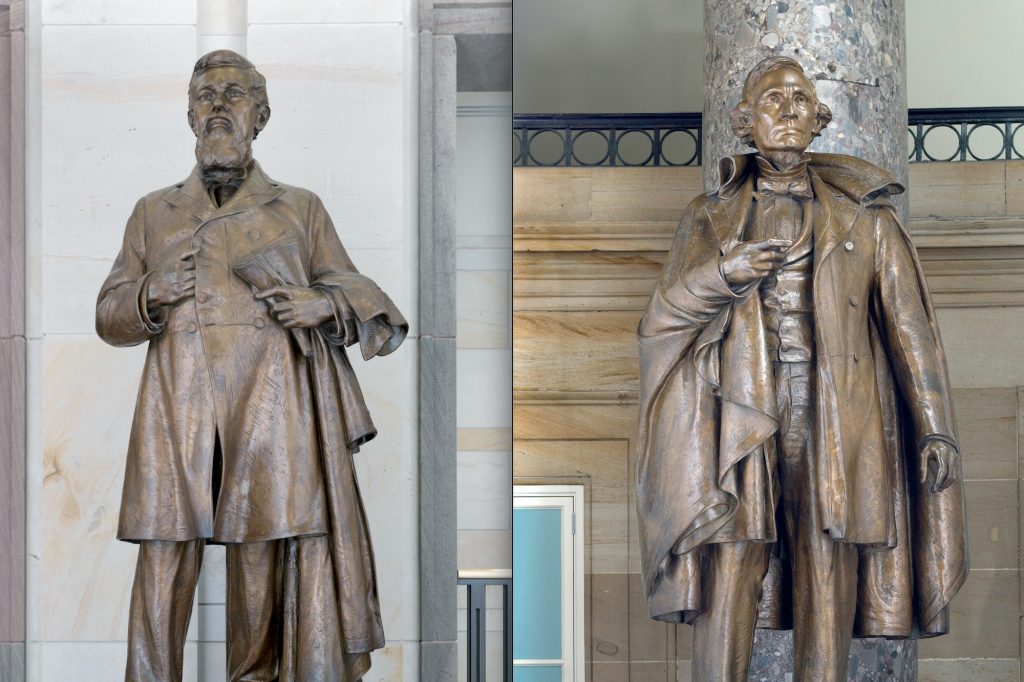U.S. House Rep. Bennie Thompson, a Black Democrat, was the lone Mississippi member to vote in favor of removing monuments devoted to white supremacists from the halls of the nation’s Capitol today. A 285-120 majority passed the bill, House Resolution 3005, this evening with all 120 nay votes coming from Republican members, including two from Mississippi.
“Statues of those who served in the Confederacy or supported slavery or segregation should not have a place of honor in the U.S. Capitol—that’s why I voted to #RemoveHate today,” Rep. Thompson, who represents Mississippi’s majority-Black 2nd Congressional District, said in a tweet today.
Each state is allowed to choose statues of notable residents to represent it in the U.S. Capitol’s Statuary Hall, but Mississippi is the only state that chose two Confederates to represent it there: Confederate President Jefferson Davis and Confederate Colonel James Zachariah George, both avowed white supremacists and slave owners in Mississippi.
After slavery’s end, J.Z. George led the effort to enshrine white supremacy into state law as one of the leading architects behind the Jim Crow provisions he and others inserted into the 1890 Mississippi Constitution, which rolled back civil-rights gains Black Mississippians had made since the Civil War. The new constitution ended democracy participation for Black Mississippians with the introductions of poll taxes, literacy tests and felony voter disenfranchisement—the latter of which remains in effect today.
“It is the manifest intention of this Convention to secure to the State of Mississippi ‘white supremacy,’” the official 1890 constitutional record stated.
H.R. 3005 would require the removal of Davis’ and George’s statues along with any monuments to white supremacists other states selected as well.
‘Confederate Statues Have No Place On Capitol Hill’
Two white Mississippi Republicans, 1st Congressional District Rep. Trent Kelly and 4th Congressional District Rep. Steven Palazzo, like most in their party, voted against removing the monuments today. Only 67 of the U.S. House’s 213 Republican members voted for H.R. 3005.
Mississippi’s 3rd Congressional District representative, Republican Michael Guest, joined 24 other GOP members and two Democrats who did not cast a vote on the bill.
“Our Capitol Building should represent those who fought for a more inclusive America. Confederate statues have no place on Capitol Hill,” Rep. Thompson, who serves Mississippi’s 2nd Congressional District, said in a tweet earlier today.
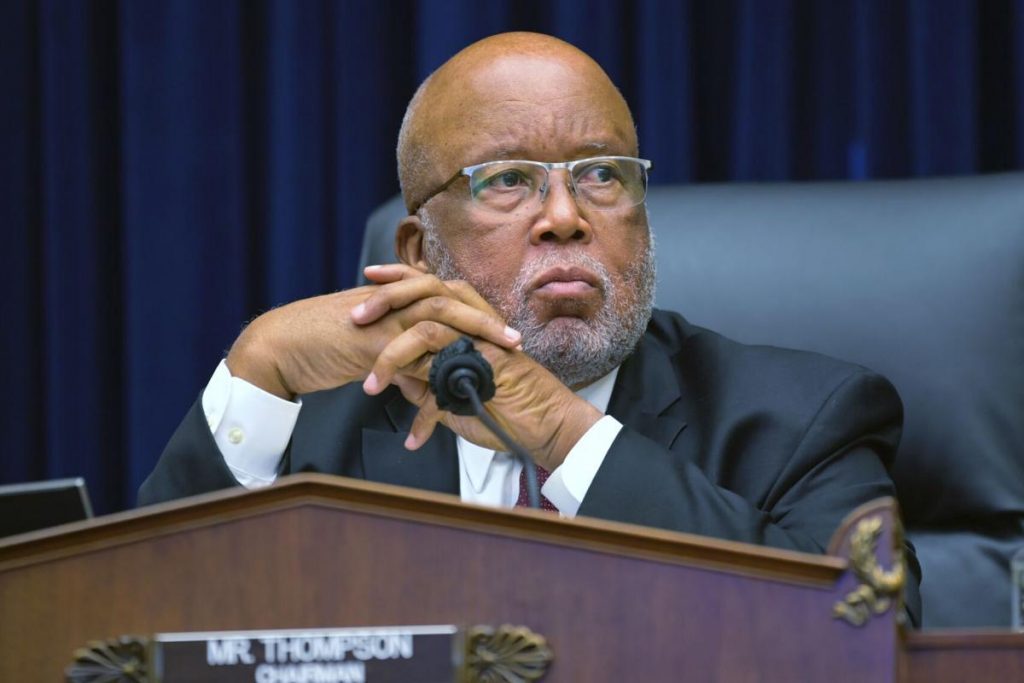
If it becomes law, H.R. 3005 would require the identification and removal of any statue or bust in the Capitol depicting an “individual who served voluntarily at any time as a member of the Armed Forces of the Confederates States of America” or “who served as an official of the Government of the Confederate States of America.”
The bill specifically requires the removal of a bust of former U.S. Supreme Court Chief Justice Roger B. Taney of Maryland, who issued the 1857 Dred Scott v. Sandford decision that declared Black people were not citizens of the United States and that Congress could not ban slavery in the states.
If H.R. 3005 becomes law, Taney’s bust at the entrance of the Old Supreme Court chamber in the U.S. Capitol would be replaced with a bust of Thurgood Marshall, the first Black member of the nation’s high court.
“While the removal of Chief Justice Roger Brooke Taney’s bust from the United States Capitol does not relieve the Congress of the historical wrongs it committed to protect the institution of slavery, it expresses Congress’s recogntion of one of the most notorious wrongs to have ever taken place in one of its rooms, that of Chief Justice Roger Brooke Taney’s Dred Scott v. Sandford decision,” the text of the bill says.
Hyde-Smith: ‘Not The Role of Congress to Dictate To States’
The U.S. Senate must approve the legislation before it can become law. The U.S. Senate is split 50-50 between the two major parties, though Democrats control the chambers thanks to Vice President Kamala Harris’ tie-breaking vote. Still, Republicans can use the filibuster to block bills that earn support from fewer than 60 members.
One of Mississippi’s two Republican U.S. senators, Cindy Hyde-Smith, signaled last year that she would oppose legislation to remove white-supremacist monuments from the U.S. Capitol.

“There are clear rules and procedures set for the designation, receipt, and placement of statues in the United States Capitol,” Hyde-Smith told Roll Call last year. “Any state, including Mississippi, can avail itself to that process if it wants to exchange statues. How to best depict the history of our nation is always up for debate, but it is not the role of Congress to dictate to states which statues should be placed in the Capitol.”
Before Hyde-Smith became a Republican, she served as a Democratic senator in the Mississippi Legislature where, in 2001, she introduced a bill that would have named a section of highway the “Jefferson Davis Memorial Highway.” During her 2018 campaign, photos of Hyde-Smith dressed in a Confederate uniform at the Jefferson Davis home in Biloxi added to the national outcry over a remark she made about a “public hanging.” This reporter broke the story that year that Hyde-Smith attended a white-only segregation academy which sprang up after the U.S. Supreme Court forced Mississippi to integrate its public schools in a late 1969 ruling.
McCarthy: ‘Democrats Can’t Hide Their Shameful History’
The Democratic-controlled U.S. House passed a bill to remove the white-supremacist monuments last year, but it died after the U.S. Senate, then controlled by Republicans, declined to consider it.
Though his party voted against removing the white-supremacy monuments by a nearly 2-to-1 vote, Republican House Minority Leader Kevin McCarthy voted for it while criticizing Democrats for holding the vote in a statement today saying, “Democrats can’t hide their shameful history.”
“The bill we’re voting on today we’ve voted on before. I supported it (then), and I support it now,” said McCarthy, who is from North Carolina. “But let me state a simple fact: All of the statues being removed by this bill are statues of Democrats.”
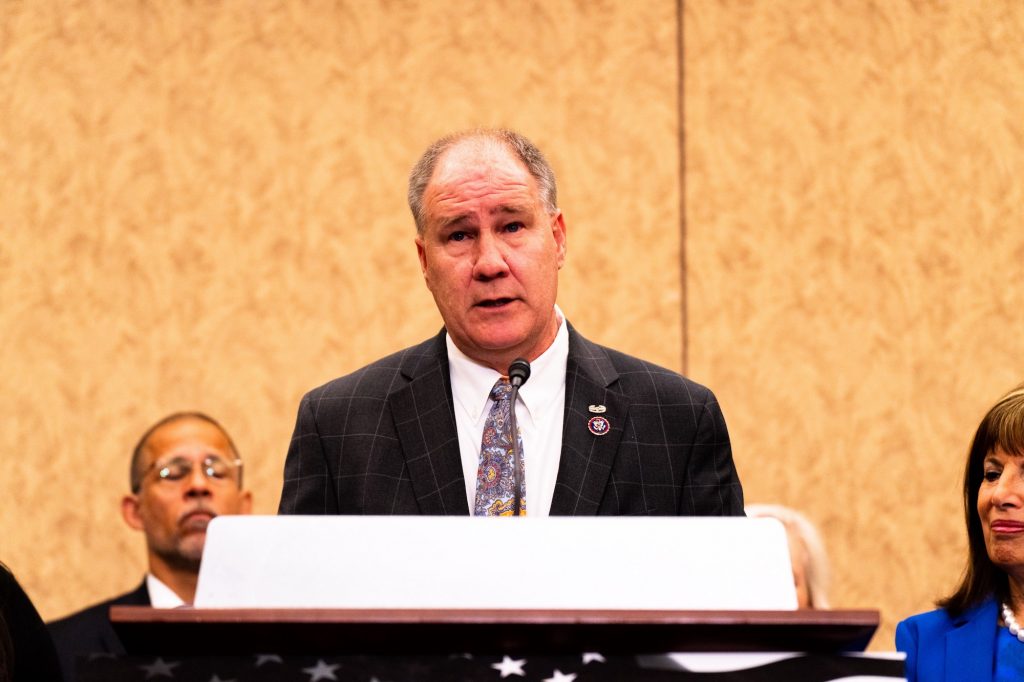
The Republican minority leader said Democrats were “desperate to pretend their party has progressed from the days of supporting slavery, pushing Jim Crow laws and supporting the KKK.”
McCarthy was referring to the fact that the southern Democratic Party historically supported slavery and segregation. Racist Democrats, known as Dixiecrats, once dominated southern states, including Mississippi. Dixiecrat legislatures in southern states chose the Confederate monuments that now reside in statuary hall.
The parties began a mass realignment after President Lyndon B. Johnson, a Democrat, signed the Civil Rights Act in 1964. In that year’s presidential election, Democratic southern states overwhelmingly voted for Republican candidate Barry Goldwater, who opposed the Civil Rights Act. In Mississippi, 87% of the white-only electorate voted for Goldwater, making it the first time the Magnolia State had voted for a Republican since Ulysses S. Grant in 1872.
After the Civil Rights Act and the 1965 Voting Rights Act, Mississippi continually shifted toward the GOP, where white Republicans now dominate the Legislature, all eight top elected statewide offices and all except Thompson’s seat in the state’s congressional delegation.
In McCarthy’s statement today, he claimed that Democrats had “doubled down” on their history by “replacing the racism of the past” with “critical race theory.” What McCarthy described was not actual critical race theory, however. Instead, he referred to anti-racist ideas, specifically mentioning Ibram X. Kendi’s book, “How To Be Anti-Racist,” which proposes solutions for combatting systemic racism. He also incorrectly labeled Nikole Hannah-Jones’ 1619 Project, which examines the historical role of slavery in America’s founding, as “critical race theory.”
“America is not a racist country,” the Republican minority leader added, echoing a sentiment that Mississippi Gov. Tate Reeves shared in April during Mississippi’s “Confederate Heritage Month” that he declared.
McCarthy said he applauded “the Democrats for removing Democrat (sic) statues” from the Capitol.
‘Homage to Hate, Not Heritage’
Democratic U.S. House Speaker Nancy Pelosi explained her support for the legislation in a speech today.
“As I have said before, the halls of Congress are the very heart of our democracy. The statues that we display should embody our highest ideals as Americans, expressing who we are and who we aspire to be as a nation,” Pelosi said. “Monuments to men or people who advocated cruelty and barbarism to achieve such a plainly racist end are a grotesque affront to those ideals. They’re homage to hate, not heritage. They must be removed.”

House Majority Leader Steny Hoyer, the Maryland Democrat who sponsored H.R. 3005, said in a speech on the House Floor today that the events of the past year have made it even more important to remove those symbols from the Capitol.
“Madam Speaker, when I brought this bill to the Floor just about a year ago, I referred to our Capitol building as a ‘sacred space’ for democracy. The intervening months have shown us in ways we could not have imagined then, just how true that statement is,” Hoyer said. “We watched our temple of democracy defiled by a violent insurrection. For many of us here, that was a watershed moment, seeing such evils pervade the halls of the American Capitol. However, for African Americans who have been serving here, working here, and visiting here for many decades, that sense of defilement of this ‘sacred space’ is all too familiar.
“Because when they see individuals like John Calhoun, Charles Aycock, and James Paul Clarke celebrated in stone and bronze in these halls, they are reminded that, for so much of our history, the leaders and leading institutions of our government and our country did not view them as equal or, at times, even human,” Hoyer continued. “When they enter the solemn old Supreme Court Chamber and stare into the cold marble eyes of Roger Brooke Taney, they are reminded that, at one time, the highest court in our land declared that Black lives did not matter.”
‘A Great Day To Advocate For State Sovereignty’
Earlier today, McCarthy unveiled a list of appointees to a taskforce to develop Republican policies that includes several members who voted against removing the white-supremacist monuments, including Rep. Palazzo. Palazzo is also currently under a U.S. House ethics investigation.
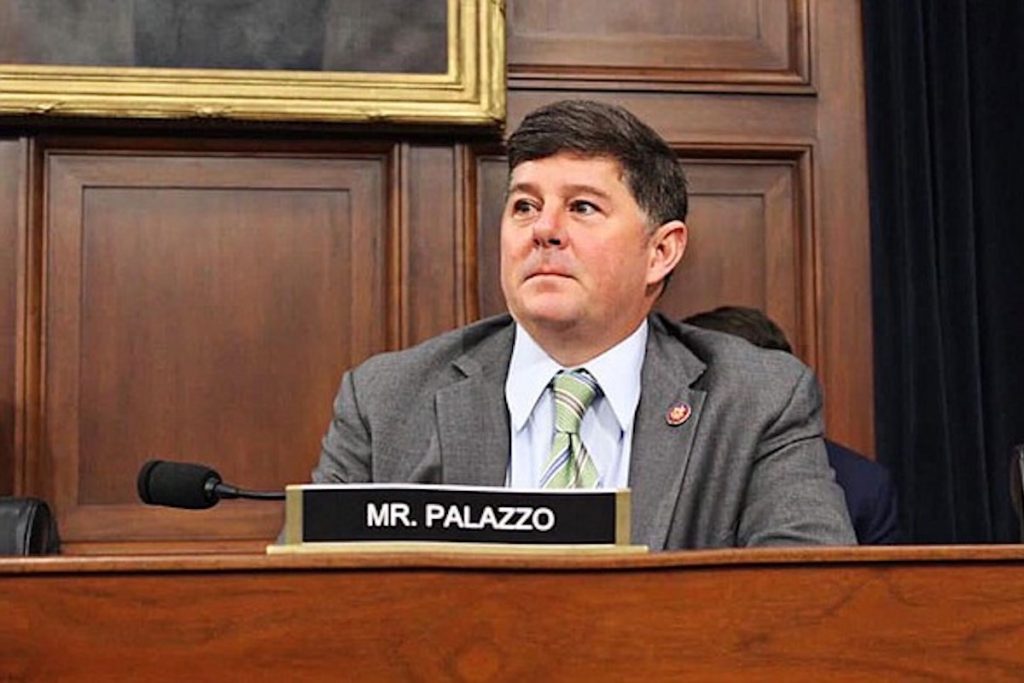
Mississippi’s Republican members have not offered explanations for their votes today. But Rep. Mo Brooks, a Republican from Alabama, tweeted his views today.
“I support federalism and a state’s right to decide for itself who it should honor. As such, I will proudly vote ‘No’ on H.R. 3005,” Brooks wrote.
Southern Dixiecrats historically used the language of “state’s rights” and “state sovereignty” to defend what they characterized as their state’s sovereign right to enslave people, demand the return of escaped enslaved people from other statesand, later, racial segregation protected in Mississippi by the Jim Crow laws that James Z. George wrote and embedded into the 1890 Mississippi constitution.
Those old Dixiecrat euphemisms for maintaining white supremacy have enjoyed a recent resurgence in use among some southern Republicans, though. Last week, Rep. Palazzo invoked it to explain his opposition to President Joe Biden’s immigration policies.
“It’s a great day to advocate for state sovereignty. I joined my GOP colleagues to remind the American people that our Constitution recognizes states’ right to defend themselves against invasion,” said Palazzo, whose state is about 900 miles from the U.S.-Mexico border.
Davis: A ‘Hero’ for Roger Wicker
WJTV reported last year that, like Hyde-Smith, U.S. Sen. Roger Wicker opposes legislation to remove white supremacist monuments from the U.S. Capitol and supports leaving decisions about who to honor in Statuary Hall up to states.
“It would be a mistake for Congress to remove statues placed in the U.S. Capitol by Mississippi or any state,” WJTV reported Wicker saying in June 2020. “In my view, such an overreach would be counterproductive to the healthy conversations on race happening across the country. Under federal law, state governments are solely responsible for selecting and replacing the statues that represent their states.”
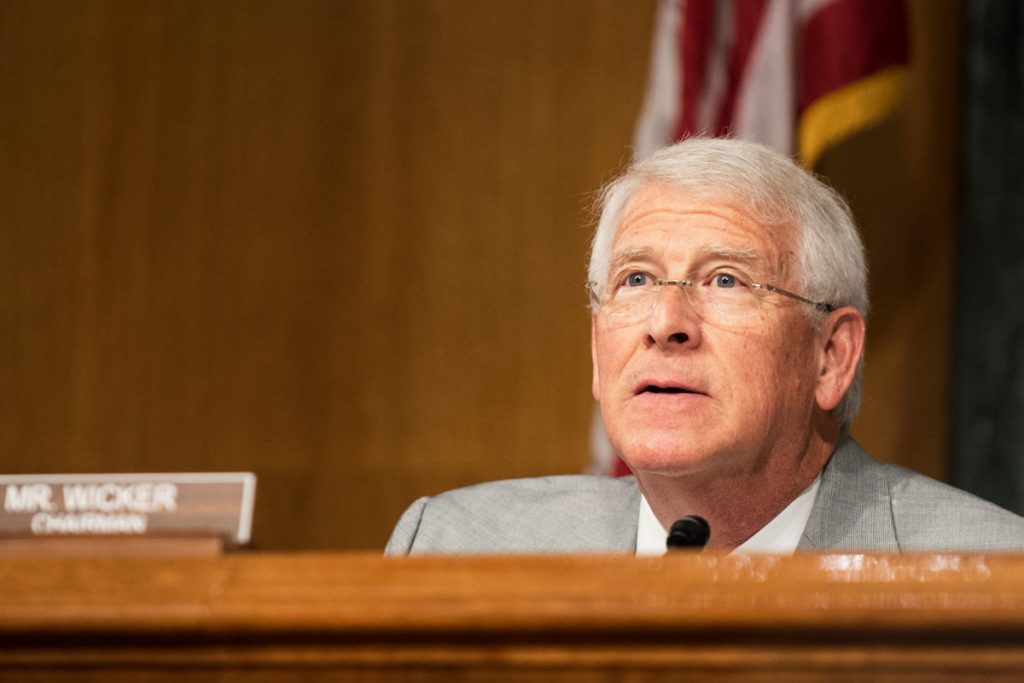
In Jackson in December 2017, Wicker offered remarks at the opening ceremony of Two Museums, including the Mississippi Civil Rights Museum. During his speech, Wicker included Jefferson Davis among a list of “heroes,” saying it was because he, as a U.S. senator in the years before becoming president of the Confederacy, had helped direct a renovation and enlargement of the U.S. Capitol.
Davis later, of course, presided over the southern insurrection against the United States to demand the continuation and expansion of slavery. After the Confederates lost the war, the United States indicted Davis for treason but never brought him to trial. Mississippi’s segregationist leaders gave the statues of Davis and George to the U.S. Capitol in 1931.
Donna Ladd contributed to this story.


